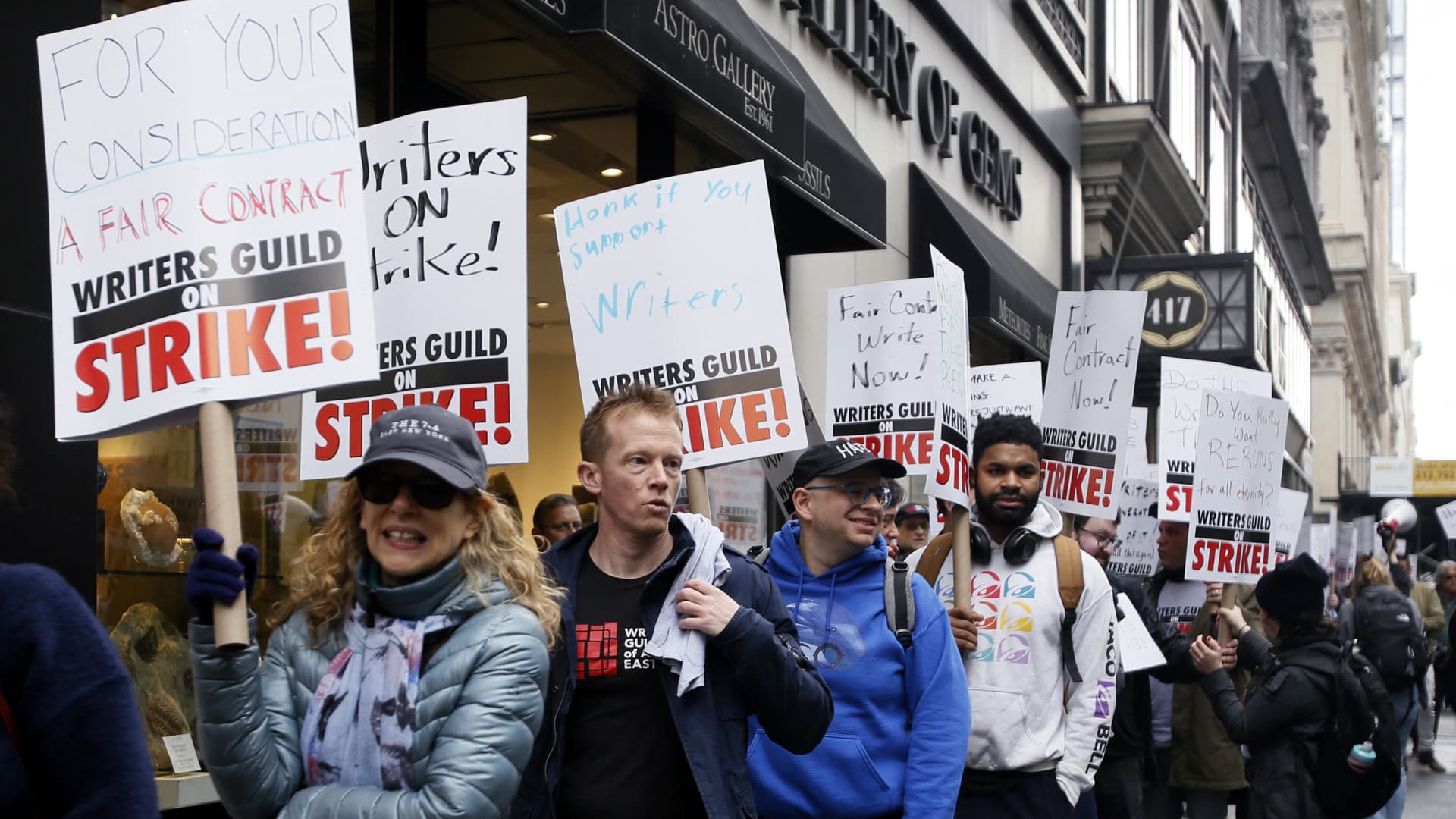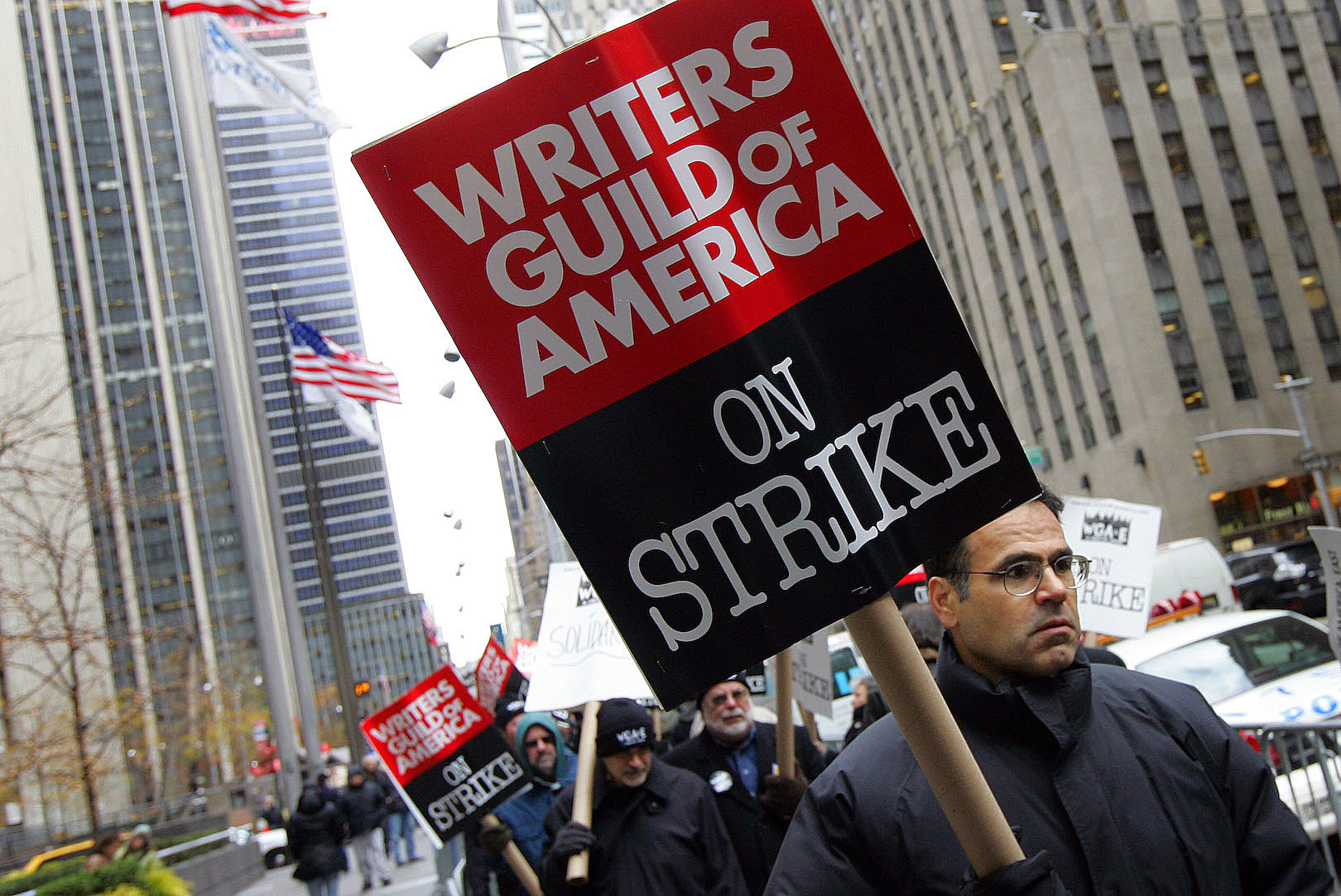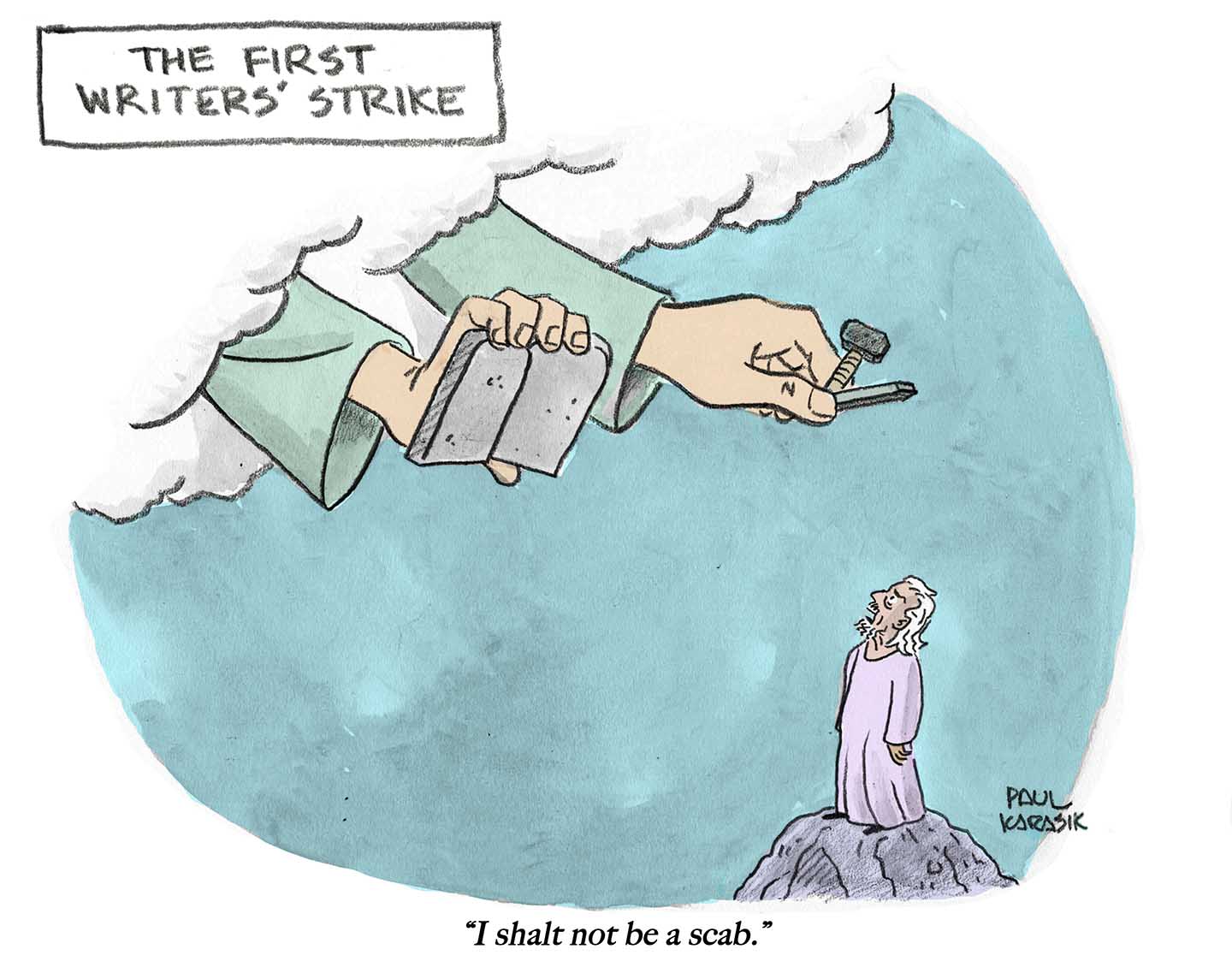Writers Strike: The Battle For Fairness In Hollywood And Beyond
Let’s just cut to the chase, folks. The writers strike is more than just a labor dispute; it’s a seismic shift in how we think about creativity, fairness, and the future of storytelling in the entertainment industry. From streaming wars to AI threats, the stakes couldn’t be higher. If you’ve been following the headlines, you’ve probably seen phrases like “writers on picket lines” and “content freeze” pop up everywhere. But what does it all mean? Let’s break it down, shall we?
This isn’t just about screenwriters demanding better pay or working conditions. It’s about protecting the heart and soul of storytelling in an era where technology is rewriting the rules. Think about it—how many times have you binge-watched a show or cried over a movie that changed your life? Behind every great story is a writer who poured their blood, sweat, and coffee into making it happen. Now, these writers are saying enough is enough.
So, why should you care? Whether you’re a fan of Netflix originals, Marvel blockbusters, or even late-night talk shows, the writers strike affects you. It’s not just Hollywood drama; it’s real-world consequences for everyone who loves good content. Stick around, because we’re diving deep into the nitty-gritty of this movement and what it means for the future of entertainment.
- Raquel Welch Life Iconic Photos Untold Stories
- Vanessa Simmons Age Weight Family Life All You Need To Know
What Exactly is the Writers Strike?
Let’s start with the basics. The Writers Guild of America (WGA) represents thousands of writers across film, TV, and digital media. In May 2023, the WGA declared a strike after negotiations with the Alliance of Motion Picture and Television Producers (AMPTP) fell apart. The main issues? Residuals for streaming content, job security in the age of AI, and fair compensation for writers working on low-budget projects.
Think about it this way: when you stream a show on Netflix or Hulu, the creators don’t get the same residuals as they would for traditional TV broadcasts. That’s a big problem when streaming is the future of entertainment. Add to that the looming threat of AI-generated scripts, and you’ve got a recipe for disaster. Writers are fighting for their livelihoods, and they’re not backing down.
The History of Writers Strikes
Believe it or not, this isn’t the first time writers have walked out. Back in 2007-2008, the WGA went on strike for 100 days, demanding fair compensation for work distributed online. Sound familiar? Back then, the internet was the disruptor; today, it’s streaming platforms and artificial intelligence. History has a funny way of repeating itself.
- Royal News King Charles Attends Event Solo Queens Absence Explained
- Jason Justine Bateman Child Stars Sibling Bonds Hollywood Now
Here’s a quick rundown of some notable writers strikes:
- 1960 Strike: Focused on residuals for reruns and syndication.
- 1988 Strike: Lasted five months and centered on residuals for home video sales.
- 2007-2008 Strike: Addressed digital distribution and internet content.
Each strike has been a response to changes in the industry, and this one is no different. As technology evolves, so do the challenges faced by writers.
Key Issues Driving the Writers Strike
Residuals for Streaming Content
Streaming platforms like Netflix, Amazon Prime, and Disney+ have revolutionized how we consume entertainment. But here’s the kicker: writers don’t get the same residuals for streaming as they do for traditional TV. Why? Because streaming platforms don’t have the same advertising revenue model. Instead, they rely on subscription fees, which means less money trickling down to the creators.
It’s not just about the numbers; it’s about fairness. Writers argue that their work is the backbone of these platforms, yet they’re being left out of the profit-sharing equation. It’s like building a house and then being told you don’t get to live in it.
The AI Threat
Artificial intelligence is the elephant in the room, and writers are understandably nervous. AI-generated scripts are already being tested in some corners of the industry, and the fear is that human writers could become obsolete. It’s not just about job security; it’s about the value of human creativity. Can a machine really replicate the emotional depth and nuance that comes from lived experience?
Writers are demanding safeguards to ensure that AI doesn’t replace them. They want clear guidelines on how AI can be used in the creative process and guarantees that human writers will still have a seat at the table.
The Economic Impact of the Writers Strike
When writers go on strike, the ripple effects are felt across the entire industry. Production halts, networks scramble for content, and fans are left wondering what to binge-watch next. But the economic impact goes beyond Hollywood. Local businesses near studios often rely on the influx of money from production crews, and when that dries up, the consequences are felt far and wide.
Here are some key stats to consider:
- 2007-2008 Strike: Estimated $2.1 billion in economic losses for Los Angeles alone.
- Current Strike: Analysts predict losses could exceed $5 billion if the strike drags on.
It’s not just about the numbers; it’s about the people whose livelihoods depend on the entertainment industry. From caterers to carpenters, the ripple effects are real.
The Role of Streaming Platforms
Netflix: The Elephant in the Streaming Room
Netflix has become synonymous with streaming, but its business model has been a point of contention for writers. The platform spends billions on original content, yet the financial rewards for writers are disproportionately small. It’s a classic case of the rich getting richer while the creators get left behind.
Netflix argues that it offers competitive upfront payments, but writers counter that residuals are crucial for long-term financial stability. It’s a debate that’s unlikely to be resolved anytime soon.
Disney+ and the Rise of the Streaming Giants
Disney+ has quickly become a major player in the streaming landscape, with a library of beloved franchises like Marvel and Star Wars. But with great power comes great responsibility, and writers are calling for transparency in how profits are shared. The battle for fair compensation isn’t just about Netflix; it’s about every platform that’s redefining the entertainment landscape.
The Future of Storytelling
As the writers strike continues, one thing is clear: the future of storytelling is at a crossroads. Will AI replace human creativity, or will it become a tool to enhance it? Will streaming platforms find a way to fairly compensate the creators who make their content possible? These are questions that don’t have easy answers.
What we do know is that the demand for great stories isn’t going away. Whether it’s on the big screen, the small screen, or your phone, people will always crave compelling narratives. The challenge is ensuring that those stories are created in a way that’s fair and sustainable for everyone involved.
How the Writers Strike Affects Fans
Let’s be real—fans are the ones who ultimately feel the brunt of the strike. Without new content to watch, the entertainment landscape becomes a barren wasteland. But it’s not just about what’s on screen; it’s about the cultural conversation that surrounds it. Think about how many times you’ve bonded with friends over a favorite show or movie. Without new content, those conversations dry up.
Here’s what fans can do:
- Stay informed about the issues driving the strike.
- Support creators by sharing their work and advocating for fair treatment.
- Engage in conversations about the future of entertainment.
Your voice matters, and the entertainment industry is listening.
International Perspectives on the Writers Strike
Canada: A Case Study in Solidarity
While the WGA strike is primarily focused on the U.S., its effects are felt globally. Canadian writers, for example, have shown solidarity with their American counterparts, highlighting the interconnected nature of the entertainment industry. This global perspective underscores the importance of addressing these issues on a larger scale.
Europe: Navigating Different Labor Laws
In Europe, labor laws vary widely, but the core issues remain the same. Writers across the continent are watching the WGA strike closely, hoping to learn from its successes and challenges. It’s a reminder that the fight for fair treatment isn’t limited to one country or region—it’s a global movement.
Call to Action: What Can You Do?
So, you’ve read this far. Now what? Here’s how you can make a difference:
- Share this article with your friends and family to spread awareness.
- Engage in conversations about the future of entertainment and the role of writers.
- Support creators by consuming their work and advocating for fair treatment.
The writers strike isn’t just about Hollywood; it’s about the value we place on creativity and storytelling. By standing with writers, we’re standing for a future where great stories can thrive.
Conclusion: The Writers Strike and Beyond
To sum it up, the writers strike is more than just a labor dispute; it’s a fight for fairness, creativity, and the future of entertainment. From residuals for streaming content to the threat of AI, the issues at stake are complex and far-reaching. But one thing is clear: the demand for great stories isn’t going away, and neither are the writers who create them.
As fans, creators, and industry insiders, we all have a role to play in shaping the future of storytelling. By staying informed, supporting creators, and advocating for fair treatment, we can ensure that the entertainment industry remains a vibrant and dynamic space for everyone involved.
So, what’s next? That’s up to all of us. Let’s keep the conversation going and work toward a future where great stories—and the people who tell them—are valued and respected.
Table of Contents
- What Exactly is the Writers Strike?
- The History of Writers Strikes
- Key Issues Driving the Writers Strike
- The Economic Impact of the Writers Strike
- The Role of Streaming Platforms
- The Future of Storytelling
- How the Writers Strike Affects Fans
- International Perspectives on the Writers Strike
- Call to Action: What Can You Do?
- Conclusion: The Writers Strike and Beyond



Detail Author:
- Name : Mr. Victor Legros
- Username : tamara.beier
- Email : kurtis23@gmail.com
- Birthdate : 1987-03-11
- Address : 847 Hal Highway Suite 601 Pagacside, CO 81329
- Phone : (913) 216-1860
- Company : Cremin, Bogan and Terry
- Job : Cost Estimator
- Bio : Ut temporibus omnis esse velit quod quasi. Necessitatibus asperiores libero non odio et. Dolores atque quasi nobis odio et inventore temporibus quia. Non optio voluptates neque eum.
Socials
facebook:
- url : https://facebook.com/claudie8397
- username : claudie8397
- bio : Ipsum maiores dolor et a. Ipsa sint soluta sequi pariatur est.
- followers : 1473
- following : 243
linkedin:
- url : https://linkedin.com/in/claudie.walker
- username : claudie.walker
- bio : Facilis qui qui non quidem voluptas ea eos.
- followers : 3774
- following : 1888